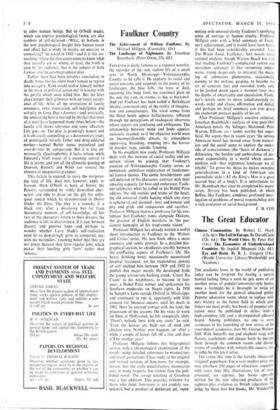Faulkner Country
The Landscape of Nightmare. By Jonathan Baumbach. (Peter Owen, 27s. 6d.) FAULKNER is justly famous as a regional novelist, the recorder of the rich, violent life of a small area in North Mississippi—Yoknapatawpha County, as he calls it. He explores its racial and social tensions, and responds to the poetry of its landscapes, the blue hills, the trees at dusk squatting like huge fowl, the continual glare of the sun, the rain, in storms, as big as buckshot. And yet Faulkner has been called a Berkeleyan idealist, convinced only of the reality of imagina- tion and consciousness. The vivid scenes from the Deep South appear hallucinatory, reflected through the perceptions of inadequate observers whose reports are confusing and ambiguous. The relationship between mind and body appears curiously strained, as if the objective world were an incomprehensible dream, its atmosphere oppressive, brooding, erupting into the horror of murder, rape, suicide, lynching.
In his excellent new study, Professor Millgate deals with this mixture of social reality and un- certain vision by arguing that Faulknefi creation of Yoknapatawpha County serves an immensely ambitious exploration of fundamen- tal human themes. The comic bewilderment and self-delusion of his characters contrast with their amazing capacity for love and endurance. Faulk- ner celebrates what he called in his Nobel Prize address 'the old verities and truths of the heart, the old universal truths lacking which any story is ephemeral and doomed—love and honour and pity and pride and compassion and sacrifice.' Professor Millgate makes a good case for his con- tention that Faulkner ranks alongside Dickens, the greatest of English novelists, in 'the pas- sionate humanity of his tragi-comic vision.'
Professor Millgate has already written a useful short introduction to Faulkner in the 'Writers and Critics' series. His new book offers a more extensive and subtle portrait. In a detailed bio- graphical section, he adjudicates sensibly between the conflicting aspects of Faulkner's life. His heavy drinking bouts occasionally necessitated hospital treatment, yet his tremendous powers of will enabled him between 1929 and 1932 to publish five major novels. He developed from the young aristocratic-looking crank, 'Count No Count' to his neighbours, to become in later years a Nobel Prize winner and spokesman for Southern moderates on Negro rights. In 1938 he bought a farm outside Oxford in Mississippi, and continued to run it, apparently with little concern for financial success, until his death in 1962. Here he enjoyed contact with the land, the procession of the seasons. On his visits to work on films at Hollywood, he felt completely alien. 'There's nobody here with any roots,' he said. 'Even the houses are built out of mud and chicken wire. Nothin' ever happens an' after a while a couple of leaves fall off a tree and then it'll be another year.'
Professor Mitigate follows this biographical section with a chronological examination of the novels, using detailed references to manuscripts and proof corrections. Close study of the original and revised versions of Sanctuary, for example, reveals that the early unsatisfactory manuscript was, in many respects, less violent than the pub- lished novel. The savage lynching of Goodwin was a late addition. This provides evidence for those who think Sanctuary is not crudely sen- sational, but a product of deliberate art, repre- senting with unusual clarity Faulkner's terrifying sense of outrage at human cruelty. Professor Mitigate ends with a brief summary of Faulk- ner's achievement, and it would have been better if this had been considerably extended. Like The Waste Land, Faulkner's best novels resist rational analysis. Joseph Warren Beach has said that reading Faulkner's complicated syntax and marathon sentences is like swimming under- water, trying desperately to interpret the mean- ing of submarine phenomena, occasionally coming to the surface, gasping, to breathe the air of concrete fact and recorded truth, only to be pushed down again a moment later into the depths of uncertainty and speculation. Faulk- ner's novels seem to move simultaneously to- wards order and chaos, affirmation and denial, and perhaps no brief summary can ever grasp the exuberant protean quality of his art.
After Professor Millgate's sensitive criticism, Jonathan Baumbach's analysis of nine post-1945 American novels (by Salinger, Malamud, Penn Warren, Ellison, etc ) seems worthy but super- ficial. He argues that in recent years 'the serious American novel has moved away from natural- ism and the social scene to explore the under- side of consciousness (the "heart of darkness"); delineating 'the burden and ambivalence of per- sonal responsibility in a world which accom- modates evil—that nightmare landscape we all inhabit.' To prove his thesis he makes sweeping generalisations in a kind of American epic journalistic style (*All the King's Men is a great scarred bear of a book'). It is unfortunate for Mr. Baumbach that since he completed his manu- script, Herzog has been published, in which Bellow, like Faulkner, combines profound inves- tigation of problems of moral responsibility with a rich evocation of social background.
C. B. COX






































 Previous page
Previous page